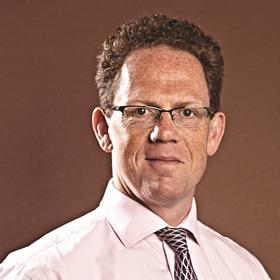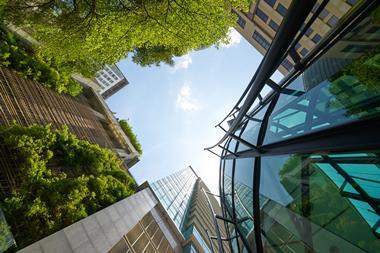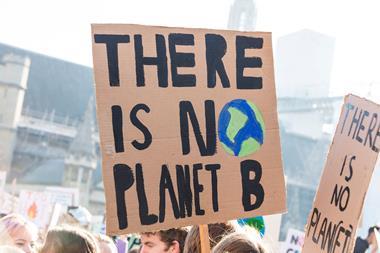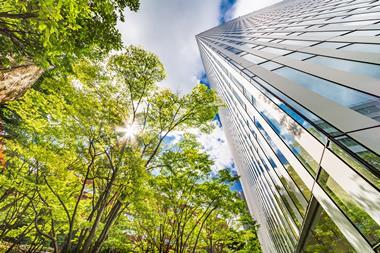Property Week asked UKGBC’s 10 built environment climate ambassadors to answer the following question: ‘What do you think the main priorities should be for businesses ahead of COP26?’ This is how they responded:
Bill Hughes

Head of real assets, Legal & General Investment Management
The COP26 summit is the 26th route by which stakeholders across the globe can work collectively to overcome the systemic issues that until now have been constraints and challenges to meeting the transition to a low-carbon economy. Glasgow is more than a mere opportunity for individual businesses to dust off their climate change messaging. We must not let a commercial and competitive dynamic restrict us from sharing knowledge and working together to take action. To deliver this, we recommend focusing on the three ‘Es’.
Education – concern around climate change has been building for more than 30 years, yet many people are still exploring how to integrate action into their everyday roles. Education and wider sharing of best practice are needed now.
Empowerment – leaders need to give their people confidence to act, but individuals also need to take responsibility so the bottom-up meets the top-down.
Evidence – lots of high-level commitments are being made, but there is a real risk of greenwashing if these are not followed through. Information and data will prove if actions are being taken and change is really happening.
Tor Burrows

Executive director of sustainability and innovation, Grosvenor
The urgent need to address the carbon emissions associated with the design, construction, management and adaptation of buildings is undeniable. We need change at scale – talk needs to become action, and COP26 must represent a turning point for a global acceleration to a low-carbon economy.
For the sector, I urge every business to do three things as soon as possible: understand and map out the impact of your business (direct and indirect emissions); set a reduction pathway in line with what the latest climate science says is needed to play your part in keeping global warming under 1.5 degrees; and report and share your progress widely.
This is not a competition – we must work together to innovate and collaborate to reduce the barriers to carbon reduction faster. With priorities rooted in climate science and a spirit of collaboration at the centre of our approaches, business can and must make a real difference.
Guy Grainger

Global head of sustainability services and ESG, JLL
We can’t get to a net zero economy without buildings. If we are going to hit 2050 net zero carbon targets, we need to set aggressive milestones for the next five and 10 years, targeting the conversion of at least 5% of buildings to net zero carbon every year. Committing to net zero is the first step, but a deep understanding is required about operating and embedded carbon, about the circular economy and about nature-based solutions and biodiversity.
This involves changing the way you work, because implementing plans across portfolios will mean changing your assessment criteria, your transactional model and your relationship with customers. Do this, and your returns will outperform. All companies and policymakers must accept that climate risk isn’t another passing trend. Amid increasing regulation and growing momentum from investors in particular, the cost of inaction for business profitability and reputation will be high.
The positive evidence is already here to inspire action. We’re seeing more pioneering net zero projects drive premium returns. You will get no plaudits for doing this in the future – now is the time to act.
Dame Alison Nimmo

Non-executive director, Berkeley Group, St Modwen Properties and MHCLG
There is huge momentum now building to COP26 and, as hosts, the eyes of the world will be on us. It takes me back to my London 2012 Olympic days, when we promised to deliver the greenest games ever and, with that ambition, we unleashed huge energy, innovation and collaboration to do just that.
I hope we can use the inspiration of COP26, and the world coming together, to accelerate our collective efforts to tackle the climate crisis. We have a big job to do, and here are my suggested four priorities.
Understand the science – if you don’t want to be too technical, there are some very accessible podcasts and books from people ranging from Bill Gates and Mark Carney to Greta Thunberg.
Measure and understand your carbon footprint, report it and publish a plan to get to net zero, with clear milestones and commitments.
Shout about what you’re doing, share your successes and encourage others – your teams, customers, development partners, investors and your supply chain.
Call out bad behaviour – there are still too many cynics greenwashing and lobbying government to water down or slow critical policies and regulation. We need to partner with government to help shape solutions, investment and progress.
Our built environment accounts for some 40% of carbon emissions. Yes, it’s part of the problem, but it’s also a huge part of the solution as we rebuild post pandemic. I’ve always believed our industry is a force for good – now we need to prove this with deeds, not words.
Sunand Prasad

Principal of Perkins&Will, co-founder of Penoyre & Prasad and chair of the board of trustees at UKGBC
To limit the rise in mean global temperature to 1.5 degrees requires us to stop burning oil, gas and coal urgently. Every business needs continually to ask: ‘How can we ensure that in every area of operation we are continually moving forcefully towards ending dependence on fossil fuels?’
Businesses that see this as an exciting opportunity to learn, to innovate and to adopt best practice will emerge stronger, more resilient, more attractive and more successful. They will also be able to realise the huge collateral benefits of action on climate change. Beyond energy and carbon reduction, the adoption of nature-based solutions and of circular-economy principles add up to living in balance with nature with a better quality of personal and social life.
This will not work top-down – everyone at every level in the company needs to be recruited to the mission. They need to become energy and carbon literate, conscious of their own part in corporate impact and empowered to act without fear. They need to help co-create and then navigate the roadmap to a fossil-fuel-free future.
Leila du Toit

Sustainability manager, Canary Wharf Contractors
Collaboration in the built-environment industry is key if we are to achieve the challenging targets of reaching net zero by 2050. With the built environment contributing approximately 40% of the UK’s total carbon footprint, we need to ensure the whole supply chain is on board and understands what is required to achieve science-based targets – from designers and architects to suppliers and contractors. We must all work together to reduce the emissions associated with our operations.
Canary Wharf Group (CWG) is committed to addressing the climate challenges that we face. Never before has there been a more urgent requirement for action, and with this comes the opportunity for collaboration across the industry to solve these challenges. It is critical we act together to create a low-carbon real estate industry, while ensuring we remain resilient in a changing market. As part of our commitment to reach net zero by 2030, CWG is working with its suppliers and tenants to encourage them to set science-based targets for carbon emission reduction by 60% from a set baseline and to publicly commit to their carbon reduction, so that we can achieve this together.
Paul King

MD sustainability and social impact, Lendlease Europe
The built environment is responsible for almost 40% of global greenhouse gas emissions and we have a huge responsibility to help limit global mean temperature rise to 1.5 degrees. Lendlease has set global targets to be net zero carbon: scopes 1 and 2 by 2025, and absolute zero carbon, scopes 1, 2 and 3, by 2040.
But we have to be bold, and we have to start now. Every company in our sector should sign up to the Race to Zero campaign, because none of us can do this on our own. This is a race that we all need to take part in, and one we can only win together.
That means we need our entire supply chain – materials producers, designers, subcontractors and our investors, customers and even our competitors – to come with us if we are to be successful, and to create the kinds of homes, offices and places that people want: ones that are healthier, better connected to nature and more resilient in the face of future challenges.
Kevin McCloud

Designer, writer and television presenter
Don’t see COP26 as a salve. Don’t think of zero carbon as the endgame. Don’t think for a moment that governments will assume the responsibility of meeting the targets other governments have set before them.
Do think beyond carbon and think how you as a business can become an environmental and social exemplar, not just in your industry but in society. Do redefine sustainability in terms of everything you do and everything you use. Do think holistically about your water use, the resources your business swallows up and your supply-chain human footprint. Create your own model for a closed-loop economy, no matter how modest to begin with. Work across your industry to build standard metrics for triple-bottom-line performance. Do see sustainability as a way to make your business more resilient, interesting, profitable and future-proofed.
Chris Brown

Executive chair, igloo Regeneration
In the property development world, the direction of travel for policy, funding and occupiers is now clear: the sector is going zero carbon, and we’re going there fast. From British Land to igloo, almost everybody is at it.
That removes the uncertainty of the past few years, although short-term challenges remain in competing for sites against those few competitors still planning obsolescent buildings. Developers need to be able to deliver buildings and places that are zero carbon to build – upfront carbon – and to live in – in-use carbon, the easy bit!
For me, the main priority for developers, ahead of COP26, should be to make a deliverable plan for their developments, and their businesses, to be zero carbon as quickly as possible, with actions, responsibilities, targets and timescales.
It’s challenging. We signed up to the UN Race to Zero campaign – which we would encourage everyone in the industry to do – and it’s taken a year or more of R&D to work out how to deliver what we call ‘Planet Positive Homes’, which are zero carbon to build and run. But now we know it’s possible, we are getting on with it.
Diba Salam

Founder and creative director, StudioDS
All businesses, regardless of size, have a part to play in the Race to Zero. Limiting global temperatures to 1.5 degrees will require all nations, businesses and individuals to shift their activities. Collaboration is key to make COP26 and beyond a success, and SMEs have an integral part to play in the ‘UK’s green industrial revolution’. Thankfully, there are resources for businesses to lean on.
As a RIBA-chartered practice, we use UN sustainable development goals (SDGs) as a tool to structure our activities and our approach to projects. We have registered our Race to Zero commitment through the SME Climate Hub and RIBA 2030 Climate Challenge, both of which offer guidance on science-based targets, which are essential in targeting the current 40% global greenhouse gas emissions from our sector alone.
Institutions and governments are responding and shifting to support SMEs; however, the built environment does need greater co-ordination. Currently, our sector is facing a crisis in PII; with limited cover and governmental limits on R&D tax relief, our sector’s ability to innovate may be restricted. The impact of the global pandemic and Brexit will affect the built environment.
Policies need to co-ordinate future targets that consider this new reality or we will see repetition of scenarios such as the scrapping of the Green Homes Grant scheme. Such efforts require greater co-ordination between government and the built environment.
From Covid tunnel to net zero funnel
- 1
- 2
 Currently reading
Currently readingTaking the road to COP26
- 3
































No comments yet